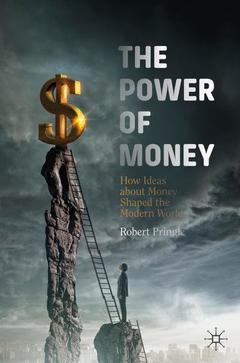Description
The Power of Money, 1st ed. 2019
How Ideas about Money Shaped the Modern World
Author: Pringle Robert
Language: English
Subjects for The Power of Money:
300 p. · 15.5x23.5 cm · Paperback
Description
/li>Contents
/li>Biography
/li>Comment
/li>
Innovation in money is just as important as innovation in any other sphere of activity; money is always a ?work in progress.? In fact, history shows societies have tried out a wide diversity of monetary arrangements. Ideas about money have played key roles at crucial turning points in world history and during national histories. Recently, a new global money space has been created, a joint venture between the public and private sector.
This book explores the new money society that has grown up to inhabit this new space. The book has several aims: Firstly, the book shows how beliefs about money, as well as attitudes and values towards it, have varied between societies and over time, and specifically how they have changed over the modern era. Secondly, the book shows the powerful effects that changing ideas have had on events, including wars and revolutions, recessions, booms and financial crises. Thirdly, the book recounts the creation of a global money space, dated to the last quarter of the 20th century, and explores its features. Fourthly, the book describes some characteristics of the new money society that inhabits the global money space. Fifthly, the book shows how each society, and indeed successive generations of the same society, has made its own unique arrangements to govern money ? i.e. how it comes to terms with the power of money.
The author argues that we need to develop a new arrangement now and suggests that we have much to learn from recent creative work in a number of fields ranging from the sociology of money to contemporary art. This approach sheds new light on a number of controversial issues, including the rise of crony capitalism, growing social divisions, currency wars, and asset price bubbles.
1. Introduction
Part One: Time Past: How ideas shaped actions
2. Europe's money and culture before 1914
3. The 1920s: Lessons from Weimar
4. The Jazz Age: America in the 1920s
5. The money-haters: experiments in socialism
6. Europe between the world wars: a ferment of ideas
7. How Europe’s culture kept money under control (1940s and 1950s)
8. New money from the New World
9. American culture and the dollar after World War II
10. The century’s hinge (mid 1960s to late 1970s)
11. 1980-2000: Creation of a global money space
Part Two: Time Present: Actions have consequences
12. The global money culture - an outline
13. Money Delusion and the crash, 2000-2010
14. Money as a tool of the state
15. The euro: the biggest money project
16. Crony and criminal capitalism since 2010
17. Global money: Insiders and Outsiders
Part Three: Time Future: Consequences engender ideas
18. The jealous state and the future of money
19. The new sociology of money
20. Money and the decline of classical liberalism
21. What can we learn from Japanese culture?
22. Contemporary art: towards new ways of ‘seeing’ money
Part Four: Concluding remarks
23. The money we deserve
Robert Pringle is an author, editor, commentator and entrepreneur specializing in money, banking and capital markets. A former Editor of The Banker, London, he was founding director of the Group of 30 institute on monetary affairs (now based in Washington, DC) from 1979 to 1986. In 1990 he founded Central Banking Publications, a financial publisher specialising in public policy and financial markets including the Central Banking journal, which he edited for 20 years. He remains chairman of the company. Robert has monitored and commented on changes in financial markets and the monetary policies of central banks around the world for more than 40 years. In addition to numerous articles for a wide variety of journals, he has published several books and edited more than 50 volumes of collected papers, surveys and training manuals for central bankers and market regulators. He has obtained a Master’s degree in economics, sociology and history from King’s College, Cambridge University, UK, and conducted post-graduate study in economics and sociology at the London School of Economics, UK.
Shows how beliefs about money, as well as attitudes and values towards it, have varied between societies and specifically how they have changed over the modern era since 1900
Discusses the creation of a global money space, which the author dates to the last quarter of the 20th century, and explores its features
Describes features of the new money society that inhabits the global money space and shows how each society, and indeed successive generations of the same society, has made its own unique arrangements to govern money




